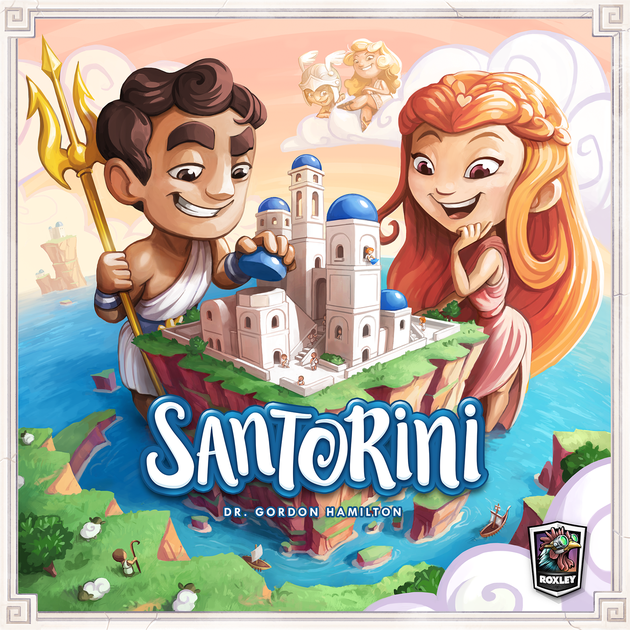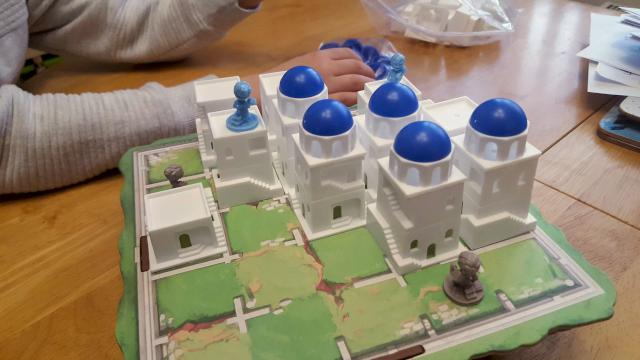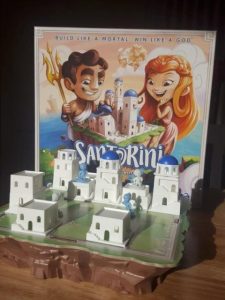
Santorini has already become a bit of a hit in the board game community, so much so that it’s taken quite some time for us to get our hands on a copy and see what all the fuss was about. Could this game really be as easy to play as the developers make out, while still having the depth and strategy that you’d want from a game of this kind? Is it worthy of the hype that has built up around the game? That’s exactly what we set out to discover, and it didn’t take us long to figure out the answers.
Based on the Greek island by the same name, Santorini has you and 1 or 2 other players acting as gods building up the island while trying to outfox each other in the process. The buildings take the form of multi-level structures with the infamous Santorini blue dome on top (if you haven’t seen the real place then head to your favourite search engine, it’s a sight to behold) and can be built up piece by piece until someone either caps it on the 4th layer with the dome, or manages to climb up onto the 3rd level for the win. I’ll come back to that in a moment.

The reason this game is so easy to pick up and play is because there’s only two things to do on each turn, and only two ways you can win. That’s not a fat lot to be thinking about, and the simplicity manifests itself into some really intriguing games. On each turn you have to carry out two actions: move and build. There’s no choice in the matter – if you can’t move and build with either of your two characters then you’re out of the game – instead you must move one of your characters to one of their 8 surrounding spaces on the board, then build something one an area surrounding where you just ended up. You can climb up a single storey when you move, and you can build on top of any uncapped building or start a whole new one on an empty space, and that’s all you need to know to play. Seriously. If you manage to climb up on top of a 3-storey building before someone puts a roof on it, you win. If you’re the last person still in the game after others get eliminated, you win. A complex, 5 hour learning curve this is not.
What this means is that anyone can play. Within 15 minutes we had three generations of our family all playing at once, and as soon as I pointed out to the 6 year old in the group how to make sure nobody can win on their next turn, it was pretty even. Younger players won’t necessarily be able to do the strategic planning that older players might, but there’s still a lot of satisfaction to be had, and my son was running rings round my mother-in-law in no time at all. The strategy calls come with how you’re going to try and win; do you position yourself in such a way that nobody can stop you from hopping up to the 3rd storey for a win, or do you try and box in your opponents so they can’t do the required move/build combination and get dropped out of the game? Maybe you’ll decide to let others do all of the setting up, then nip in at the last moment and steal their victory from them… whatever you choose the rules are so straightforward that you’ll be able to actually focus on a plan without having to recall every last intricacy in the rulebook.
 Once you’re settled with the rules, the God cards rock up and put another spin on things. Giving players additional benefits or abilities, these cards totally change how the game is played through individual little tweaks. Using the God which allows you to build twice per turn, or move multiple times gives a very different dynamic to things, making planning tougher considering you’ve got more possible opponent moves to predict before the game reaches you again. Other cards add easier win conditions, or even mix the game up by providing a different God card in every turn. The variety these cards offer up are fantastic, and certainly help keep the game fresh and interesting for far longer.
Once you’re settled with the rules, the God cards rock up and put another spin on things. Giving players additional benefits or abilities, these cards totally change how the game is played through individual little tweaks. Using the God which allows you to build twice per turn, or move multiple times gives a very different dynamic to things, making planning tougher considering you’ve got more possible opponent moves to predict before the game reaches you again. Other cards add easier win conditions, or even mix the game up by providing a different God card in every turn. The variety these cards offer up are fantastic, and certainly help keep the game fresh and interesting for far longer.
So after waiting to get a chance to try out Santorini, I’m absolutely delighted that the opportunity finally presented itself. The creators’ claims of being easy to learn are spot on, and yet unlike a lot of other simple games the depth on offer here while still being a massively accessible game is brilliant. With Christmas round the corner you could do far worse than to pick this up for some fun gaming, and while the low player count might not suit larger families the games a quick enough that everyone will be able to get a game in before too long. Definitely a worthy purchase, and will look great alongside the rest of your games collection.

Leave a Reply